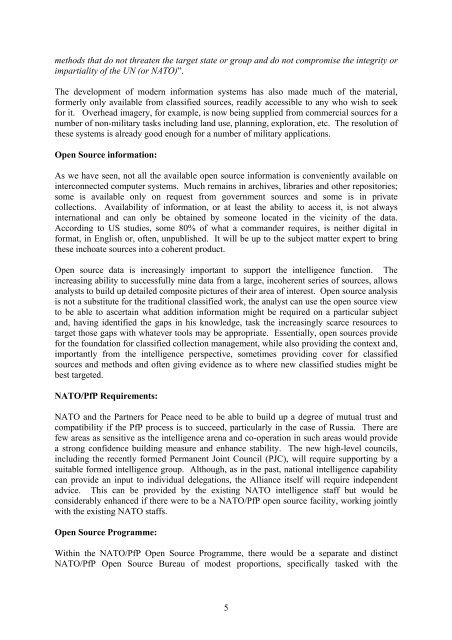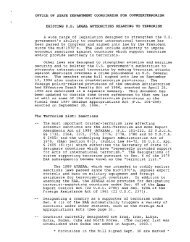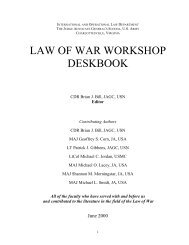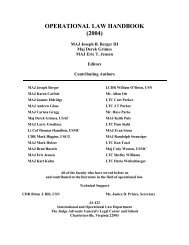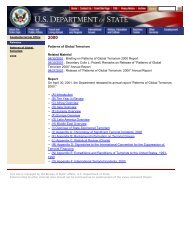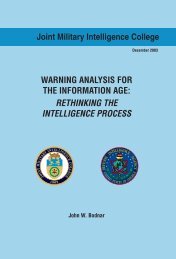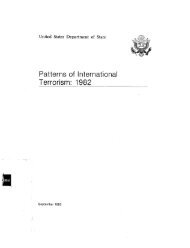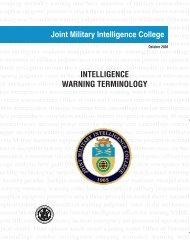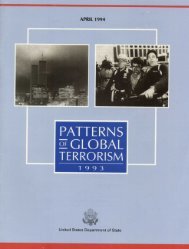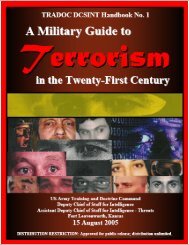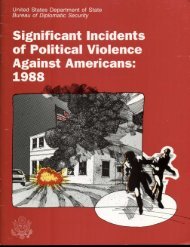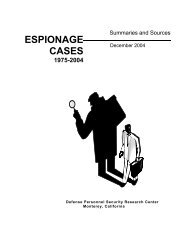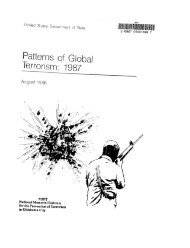OPEN SOURCE INTELLIGENCE - The Challenge for NATO - OSS.net
OPEN SOURCE INTELLIGENCE - The Challenge for NATO - OSS.net
OPEN SOURCE INTELLIGENCE - The Challenge for NATO - OSS.net
Create successful ePaper yourself
Turn your PDF publications into a flip-book with our unique Google optimized e-Paper software.
methods that do not threaten the target state or group and do not compromise the integrity or<br />
impartiality of the UN (or <strong>NATO</strong>)”.<br />
<strong>The</strong> development of modern in<strong>for</strong>mation systems has also made much of the material,<br />
<strong>for</strong>merly only available from classified sources, readily accessible to any who wish to seek<br />
<strong>for</strong> it. Overhead imagery, <strong>for</strong> example, is now being supplied from commercial sources <strong>for</strong> a<br />
number of non-military tasks including land use, planning, exploration, etc. <strong>The</strong> resolution of<br />
these systems is already good enough <strong>for</strong> a number of military applications.<br />
Open Source in<strong>for</strong>mation:<br />
As we have seen, not all the available open source in<strong>for</strong>mation is conveniently available on<br />
interconnected computer systems. Much remains in archives, libraries and other repositories;<br />
some is available only on request from government sources and some is in private<br />
collections. Availability of in<strong>for</strong>mation, or at least the ability to access it, is not always<br />
international and can only be obtained by someone located in the vicinity of the data.<br />
According to US studies, some 80% of what a commander requires, is neither digital in<br />
<strong>for</strong>mat, in English or, often, unpublished. It will be up to the subject matter expert to bring<br />
these inchoate sources into a coherent product.<br />
Open source data is increasingly important to support the intelligence function. <strong>The</strong><br />
increasing ability to successfully mine data from a large, incoherent series of sources, allows<br />
analysts to build up detailed composite pictures of their area of interest. Open source analysis<br />
is not a substitute <strong>for</strong> the traditional classified work, the analyst can use the open source view<br />
to be able to ascertain what addition in<strong>for</strong>mation might be required on a particular subject<br />
and, having identified the gaps in his knowledge, task the increasingly scarce resources to<br />
target those gaps with whatever tools may be appropriate. Essentially, open sources provide<br />
<strong>for</strong> the foundation <strong>for</strong> classified collection management, while also providing the context and,<br />
importantly from the intelligence perspective, sometimes providing cover <strong>for</strong> classified<br />
sources and methods and often giving evidence as to where new classified studies might be<br />
best targeted.<br />
<strong>NATO</strong>/PfP Requirements:<br />
<strong>NATO</strong> and the Partners <strong>for</strong> Peace need to be able to build up a degree of mutual trust and<br />
compatibility if the PfP process is to succeed, particularly in the case of Russia. <strong>The</strong>re are<br />
few areas as sensitive as the intelligence arena and co-operation in such areas would provide<br />
a strong confidence building measure and enhance stability. <strong>The</strong> new high-level councils,<br />
including the recently <strong>for</strong>med Permanent Joint Council (PJC), will require supporting by a<br />
suitable <strong>for</strong>med intelligence group. Although, as in the past, national intelligence capability<br />
can provide an input to individual delegations, the Alliance itself will require independent<br />
advice. This can be provided by the existing <strong>NATO</strong> intelligence staff but would be<br />
considerably enhanced if there were to be a <strong>NATO</strong>/PfP open source facility, working jointly<br />
with the existing <strong>NATO</strong> staffs.<br />
Open Source Programme:<br />
Within the <strong>NATO</strong>/PfP Open Source Programme, there would be a separate and distinct<br />
<strong>NATO</strong>/PfP Open Source Bureau of modest proportions, specifically tasked with the<br />
5


